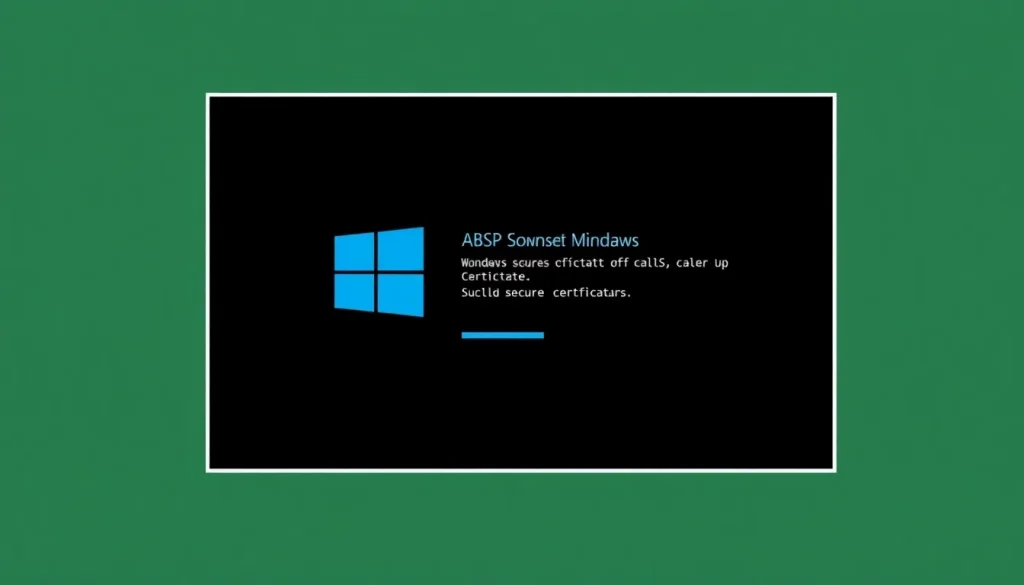Windows secure boot certificates are about to expire soon

As technology continues to evolve, understanding the underlying frameworks that support our operating systems becomes crucial. Windows' Secure Boot feature, initially launched in 2012, has grown to become a cornerstone of system security. However, a significant change is on the horizon that could impact users worldwide.
In this article, we will explore the implications of the upcoming expiration of Secure Boot certificates, what this means for Windows users, and how to prepare for a smooth transition in the wake of these changes.
- What is Secure Boot and why is it important?
- Do Windows licenses expire?
- What happens when a Secure Boot certificate expires?
- Duration of Windows licenses and support timelines
- How to boot Windows 10 in Safe Mode if it won’t start
- Systems affected by the expiration of Secure Boot certificates
- What can I do to avoid problems with my system?
What is Secure Boot and why is it important?
Secure Boot is a security standard created to ensure that a device boots using only software that is trusted by the manufacturer. This feature validates the digital signature of each piece of software during the boot process, effectively preventing the execution of unauthorized or malicious code. The introduction of Secure Boot has significantly enhanced the security posture of Windows systems, safeguarding them from various attacks, including rootkits and bootkits.
Since its inception, Secure Boot has been a critical requirement for running Windows 11, as well as for specific applications and games. Notably, popular titles like Call of Duty Black Ops 7 and Battlefield 6 require Secure Boot to function properly, making it essential for both casual and serious gamers alike.
Do Windows licenses expire?
One of the key aspects of maintaining an operating system is ensuring that all components, including licenses, are up-to-date. Windows licenses do not expire in the traditional sense; however, the support for older versions does end, leading to a lack of updates. As mentioned previously, support for Windows 10 will cease on October 14, 2025, meaning users will no longer receive updates, including those crucial for Secure Boot.
What happens when a Secure Boot certificate expires?
The certificates used in Secure Boot are vital for a seamless boot process. These certificates, which were initially issued in 2011, have a validity period of 15 years. With their expiration approaching in June 2026, it raises concerns for many users. If these certificates become invalid, the Secure Boot feature will not operate as intended, potentially preventing the operating system from booting altogether.
Duration of Windows licenses and support timelines
Windows licenses do not have a specific expiration date, but support timelines are critical to understand. Here is a brief overview:
- Windows 10 support ends on October 14, 2025.
- Windows 11 will continue to receive updates as long as it is supported.
- Windows Server operating systems have varying support timelines, generally lasting 5-10 years.
Users should be aware of these timelines to ensure they remain in a supported environment.
How to boot Windows 10 in Safe Mode if it won’t start
In cases where Windows 10 fails to start, entering Safe Mode can be a lifesaver. Safe Mode loads only the essential drivers and services required for Windows to function, allowing users to troubleshoot problems effectively. Here’s how you can initiate Safe Mode:
- Restart your computer and press the F8 key repeatedly before the Windows logo appears.
- Select Safe Mode or Safe Mode with Networking from the options.
- If you cannot access the login screen, force shut down the device three times to trigger the Windows Recovery Environment.
- From the Recovery Environment, navigate to Troubleshoot > Advanced options > Startup Settings and select Restart.
- After the restart, press 4 or F4 to enter Safe Mode.
Systems affected by the expiration of Secure Boot certificates
The expiration of the Secure Boot certificates will impact various systems. Here’s a list of those that will be affected:
- Physical and virtual machines running Windows.
- Windows 10.
- Windows 11.
- Windows Server 2022.
- Windows Server 2019.
- Windows Server 2016.
- Windows Server 2012.
- Windows Server 2012 R2.
Interestingly, Microsoft has confirmed that PCs and laptops equipped with Copilot+ launched in 2025 will not face issues related to the expiration of these certificates.
What can I do to avoid problems with my system?
To mitigate potential issues arising from the certificate expiration, Microsoft is set to release updates that will include new Secure Boot certificates. As a user, the best course of action is to:
- Keep your operating system updated: Ensure that you regularly check for and install updates.
- Consider upgrading to Windows 11: If you’re still on Windows 10, migrating to Windows 11 is recommended to maintain support.
- Explore Extended Support options: If you choose to remain on Windows 10, you may need to opt for Microsoft’s Extended Support plan for continued updates.
The new certificates have been dated in 2023, and Microsoft has provided a complete list of those that will be available in the upcoming months. Staying informed will help ensure that your system remains secure and functional.
For those looking to learn more about managing Secure Boot settings, the following video may be helpful:
In conclusion, understanding the implications of Secure Boot certificate expiration is vital for Windows users. The proactive measures discussed will help ensure that your systems remain secure and operational as we approach the upcoming changes.




Leave a Reply